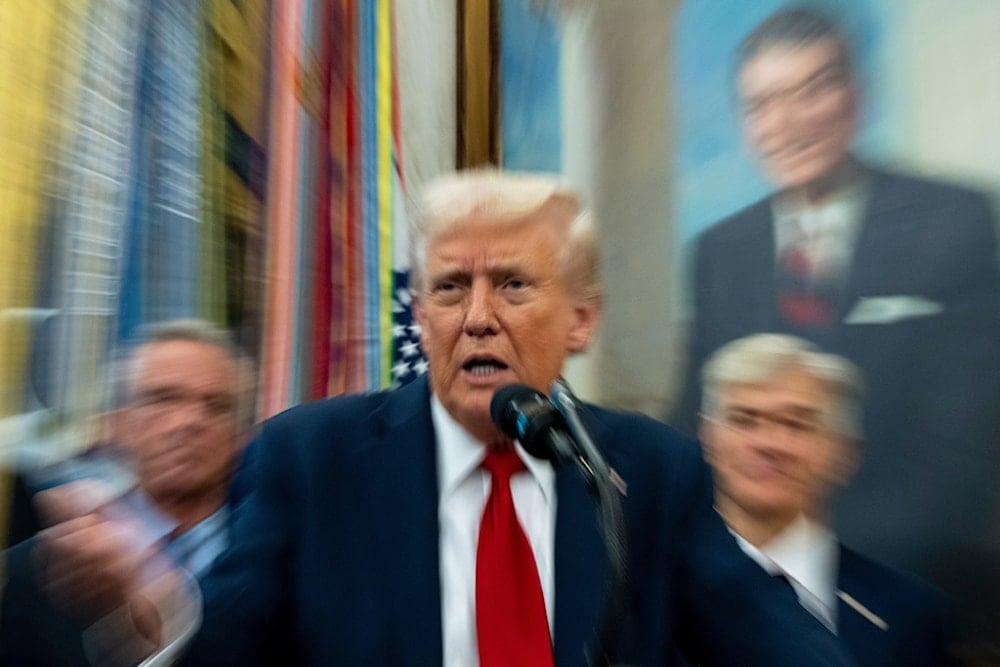Trump hints at decisive US action, says Russia will be 'taken care of'
US President Donald Trump vowed to "get Russia taken care of somehow," signaling a harder line amid reports of expanded US intelligence support for Ukrainian strikes.
-

In this photo made with a slow shutter speed, President Donald Trump speaks in the Oval Office of the White House, Tuesday, Sept. 30, 2025, in Washington (AP Photo/Alex Brandon)
US President Donald Trump on Thursday signaled a tougher stance toward Moscow, declaring that Washington would "get Russia taken care of somehow" as part of efforts to end the ongoing war in Ukraine. His remarks, delivered in an interview with One America News Network, come amid a deepening stalemate in peace talks between Moscow and Kiev.
"We'll get Russia taken care of somehow. We're going to get that [conflict done]," Trump said, suggesting a shift toward a more assertive US posture as the conflict enters a new and volatile phase.
Crossing Red Lines
The statement follows reports that the United States is expanding its involvement behind the scenes, providing intelligence support to guide Ukrainian missile strikes deep inside Russian territory, particularly against energy and logistics infrastructure. Washington's latest measures mark a significant escalation from previous policy, which restricted such operations to targets within Ukraine's borders.
According to The Guardian, US officials have quietly authorized intelligence-sharing to support long-range strikes, reflecting growing confidence in Ukraine's precision capabilities. The move coincides with discussions in Washington over potentially supplying Tomahawk cruise missiles, a step that Moscow has warned would cross a dangerous red line. Kremlin spokesman Dmitry Peskov said earlier Thursday that such a transfer would represent a "serious escalation of tensions that will require an adequate response from Russia," insisting that "no weapon can radically change the course of events on the front line."
Peskov also accused Kiev of rejecting dialogue, claiming that "the Kiev regime's position is quite abstract" and that "they don't want to continue negotiations." He added that Moscow remains open to talks but sees "an unclear horizon for continuing these negotiations."
Stalemate and Escalation
The diplomatic freeze has persisted despite Trump's earlier pledge to mediate between Moscow and Kiev. His much-publicized meeting with Russian President Vladimir Putin at the August Alaska Summit ended without any framework for ceasefire or peace. Washington's insistence that Ukraine negotiate from a position of strength clashed with Russia's demands for recognition of its territorial claims, leaving little room for compromise.
Analysts say Trump's comment reflects mounting frustration in Washington with the stalled diplomatic process and the rising economic and political costs of the war. By pledging to "take care" of Russia, the president appears to be signaling readiness to apply intensified pressure, whether through expanded military aid, covert operations, or diplomatic isolation, to compel Moscow toward a settlement on US terms.
Read more: Russian missiles outsmart US Patriot defenses in Ukraine: FT
The remark also comes as tensions between Moscow and the West reach new highs. Russian officials have accused the United States of transforming the conflict into a "fiery war," warning that the current phase goes beyond Cold War-era containment and into direct confrontation. They argue that US actions, including deeper intelligence support, advanced arms deliveries, and sanctions, reflect a broader strategy aimed at weakening Russia rather than achieving peace.
Meanwhile, the Kremlin has sought to frame the confrontation as part of a global struggle against Western dominance. Peskov confirmed that President Putin will use his upcoming address at the Valdai Discussion Club to outline Moscow's vision for a new world order, one shaped by what he described as Western "overreach" and Europe's "unrestrained" posture. Russian officials say the speech will highlight what they view as the root causes of the crisis, NATO expansion, disregard for Russian security concerns, and systemic Western interference.

 4 Min Read
4 Min Read











